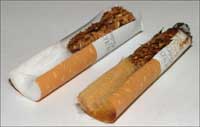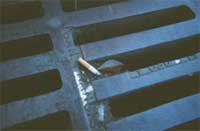The Impacts of Cigarette Butt Litter
 Cigarette filters may look like cotton, but are made of cellulose acetate, a plastic that is slow to degrade in the environment. Cigarette filters are specifically designed to accumulate particulate smoke components including toxic chemicals. (Source: Bulletin of the American Littoral Society)
Cigarette filters may look like cotton, but are made of cellulose acetate, a plastic that is slow to degrade in the environment. Cigarette filters are specifically designed to accumulate particulate smoke components including toxic chemicals. (Source: Bulletin of the American Littoral Society)
There are many impacts of cigarette litter, including:
» Toxic chemicals leaching out of cigarette butts and can kill small animals;
» Ingestion by children and small animals (mistaken as food);
» The cost of cleaning up litter and lost revenue from visitors.
Read more here.
The Facts About Cigarette Butts and Litter
 There is a lot of misinformation out there regarding cigarette butt litter. The biggest myth is that cigarette filters are biodegradable. In fact, cigarette butts are not biodegradable in the sense that most people think of the word. The acetate (plastic) filters can take many years to decompose. Smokers may not realize that their actions have such a lasting, negative impact on the environment. (Source:cigarettelitter.org)
There is a lot of misinformation out there regarding cigarette butt litter. The biggest myth is that cigarette filters are biodegradable. In fact, cigarette butts are not biodegradable in the sense that most people think of the word. The acetate (plastic) filters can take many years to decompose. Smokers may not realize that their actions have such a lasting, negative impact on the environment. (Source:cigarettelitter.org)
"[Cigarette butts] also present a threat to wildlife. Cigarette filters have been found in the stomachs of fish, birds, whales and other marine creatures who mistake them for food ... Composed of cellulose acetate, a form of plastic, cigarette butts can persist in the environment as long as other forms of plastic."
Guide to Cigarette Litter Prevention
The Cigarette Litter Prevention Program is one in Keep America Beautiful's portfolio of programs. It is designed to support local community improvement initiatives for reducing cigarette butt litter.
Read more here.